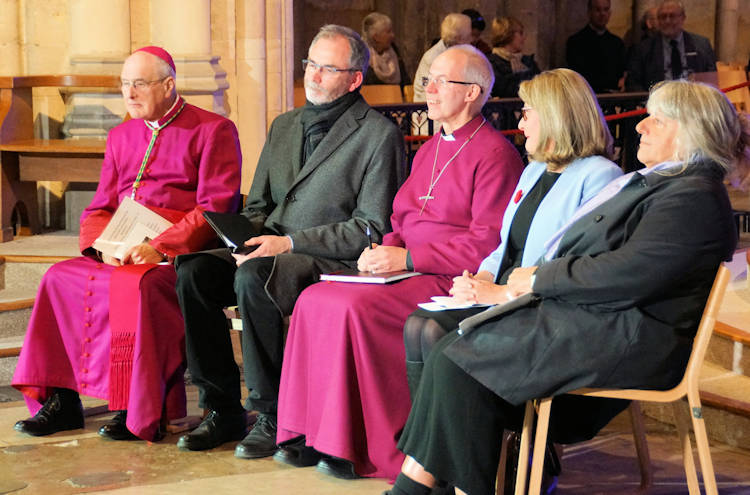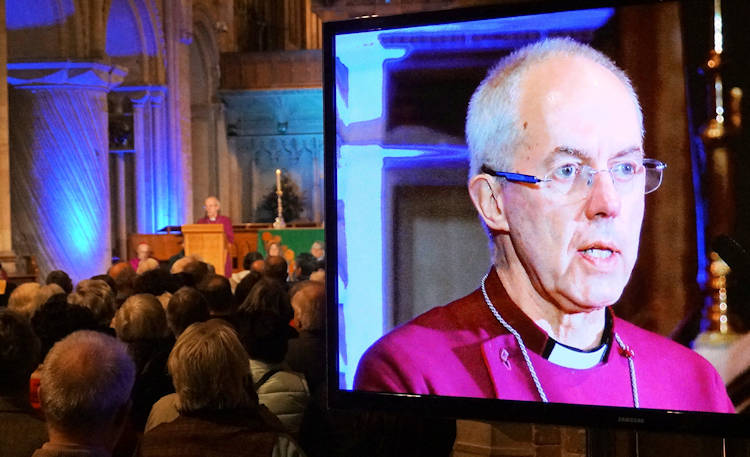
Archbishop Justin leads exploration of reconciliation
The need for reconciliation in the church and in the world was at the heart of an evening of reflection involving Archbishop Justin Welby at a packed Norwich Anglican Cathedral last night. Keith Morris reports.
The exploration of reconciliation, chaired by Bishop Graham James, heard from Pastor Rolf Stahl from Koblenz, Norwich’s German twin-town; Dr Marian Prinsley, President of the Norwich Hebrew Congregation; the Rt Rev Alan Hopes Catholic Bishop of East Anglia; and Dee Robinson, of New Routes Integration, a refugee integration project in Norwich.
In front of a 500-strong audience, they discussed the need for reconciliation in post-war Germany, in a world peopled by record numbers of homeless refugees and in the treatment of the Jewish people in medieval Norwich and current day Pittsburgh.
 Addressing religious divisions, Bishop Alan Hopes said: “Because our history is so intertwined, Christians should now take the lead in repudiating all forms of anti-Semitism or anti-Islamic activity. Reconciliation compels us to seek to forget the hostilities and differences of the past and work together towards mutual understanding and benefit in the future, as this can only lead to greater peace and justice in the world. Addressing religious divisions, Bishop Alan Hopes said: “Because our history is so intertwined, Christians should now take the lead in repudiating all forms of anti-Semitism or anti-Islamic activity. Reconciliation compels us to seek to forget the hostilities and differences of the past and work together towards mutual understanding and benefit in the future, as this can only lead to greater peace and justice in the world.
“For the Christian, reconciliation can only be achieved throughout the world when we all learn to love and accept the other specifically because we know that they too, just like us, are loved and accepted by God, who is the Father of us all.”
Archbishop Justin brought the reflections to a close, drawing on his own personal experiences of reconciliation over many years in Africa and the Middle East and also in his own family life when his baby daughter Johanna was killed in a car crash.
“Reconciliation is a rare and fragile thing but peace and reconciliation are not the same,” he said.
“Evil is part of the human condition and occasionally something happens to release these evil forces. People don’t choose evil but its power can make us all vulnerable.
“Reconciliation at its heart is the creation of a framework of living that enables disagreement to be transformed from violence to non-violence – that enables us to disagree well. In disagreeing well we respect the humanity of the other and we respect it more because we disagree. We are saying we take you seriously.”
Reconciliation starts with seeing it as a possibility and with listening. It is a process and can go on for a long time, and it is deeply risky explained Archbishop Justin.
“Without justice reconciliation cannot happen. Justice and relationship lead to the possibility of peace. Reconciliation offers life, life for societies and life for individuals.
“A world in which reconciliation is something we seek and expect, a world in which we disagree with passion but never with violence, in which we put forward views with conviction but never with hatred, that is a liberated world,” he concluded.
Pictured top is the panel of speakers on reconciliation, and, above, Archbishop Justin Welby.
|